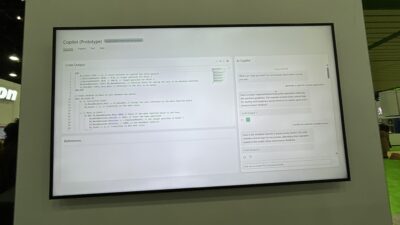Artificial intelligence (AI) is evolving and it is having a major impact on manufacturing and workers' jobs. See video.

Omron Open 2023 in Hoffman Estates, Ill., emphasized artificial intelligence (AI) and how its evolution and rise in the public consciousness and what it means for the future. In a video interview, Paul Anderson, director of field application engineering for Omron, discussed the rise of AI in the public consciousness and how Omron has utilized it in their manufacturing operations.
In his keynote presentation at the event, “Is AI Coming for My Job?” Anderson outlined how AI has evolved and how automation’s evolution has changed the nature of work and how people have always adapted. Anderson argued workers should know their value and advocate their strengths and unique abilities in their role. “If you’re committed to knowing your value and willing to push forward, you will thrive.”
In the interview, he said AI is nothing new when it comes to Omron’s operations. “We’ve been using AI for quite some time now, actually. We have an AI controller that allows customers to use machine learning (ML) in predictive maintenance applications for anomaly detection. We’ve also been using it in vision processing.”
As far as the impact of AI and human jobs is concerned, he said, “I don’t think we’re looking at AI coming in and taking jobs tomorrow. I think the bigger thing right now is AI is gonna be impacting what jobs look like and I think people are comfortable with the jobs that they know and so we’re all having to adapt faster because these changes are coming quicker. So we don’t really know what it’s going to look like exactly and I think that’s the bigger fear. Fear of this new technology is the really biggest thing people are facing.”
Anderson also talked about automation’s growing role in manufacturing and how it can complement and enhance AI. “I think we’re gonna see it in terms of line side when it comes to inspection. How can we see parts that are failing instead of getting them all the way through the line and can AI detect problems earlier up so we’re not having to waste production throughput? I also think we’re going to see, more and more, that robotics become AI-friendly and start to learn different processes and then we can leverage one person to teach a bunch of different processes out so the robots can learn that via AI.”
Other topics discussed in the video interview include having companies AI in their day-to-day operations and what the future of automation and AI might look like.
Chris Vavra, web content manager, CFE Media and Technology, [email protected].



